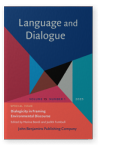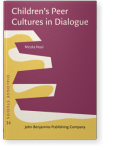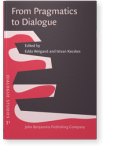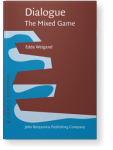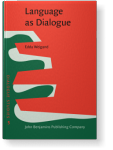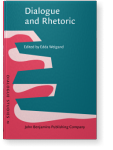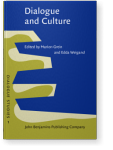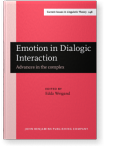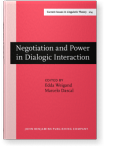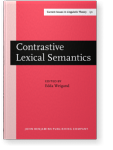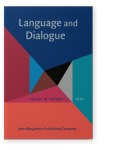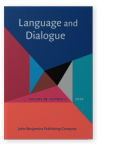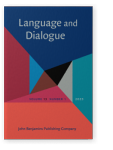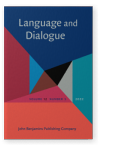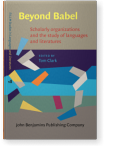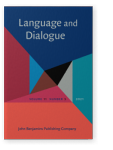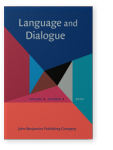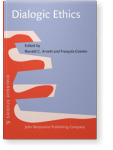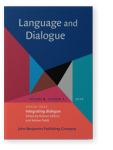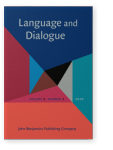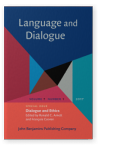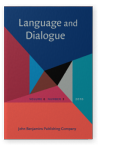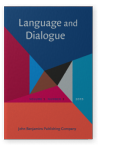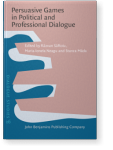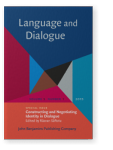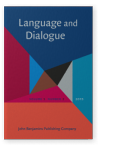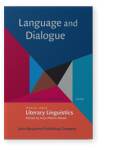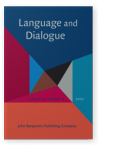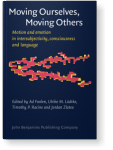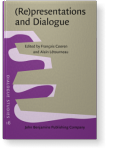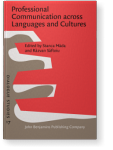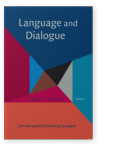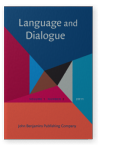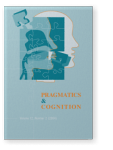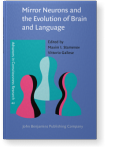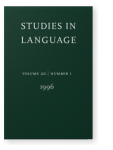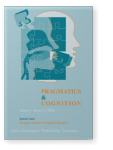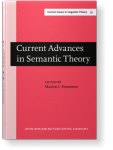Edda Weigand
List of John Benjamins publications for which Edda Weigand plays a role.
Journal
Book series
From Pragmatics to Dialogue
Edited by Edda Weigand and István Kecskés
[Dialogue Studies, 31] 2018. v, 222 pp.
Subjects Dialogue studies | Discourse studies | Pragmatics
Subjects Cognitive psychology | Communication Studies | Dialogue studies | Discourse studies | Philosophy | Pragmatics
Language as Dialogue: From rules to principles of probability
Edda Weigand
[Dialogue Studies, 5] 2009. viii, 410 pp.
Subjects Communication Studies | Dialogue studies | Discourse studies | Philosophy | Pragmatics
Subjects Communication Studies | Dialogue studies | Discourse studies | Philosophy | Pragmatics
Dialogue and Culture
Edited by Marion Grein and Edda Weigand
[Dialogue Studies, 1] 2007. xii, 262 pp.
Subjects Communication Studies | Dialogue studies | Discourse studies | Pragmatics
Emotion in Dialogic Interaction: Advances in the complex
Edited by Edda Weigand
[Current Issues in Linguistic Theory, 248] 2004. xii, 284 pp.
Subjects Discourse studies | Pragmatics
Negotiation and Power in Dialogic Interaction
Edited by Edda Weigand and Marcelo Dascal †
[Current Issues in Linguistic Theory, 214] 2001. viii, 294 pp.
Subjects Discourse studies | Pragmatics
Contrastive Lexical Semantics
Edited by Edda Weigand
[Current Issues in Linguistic Theory, 171] 1998. x, 270 pp.
Subjects Comparative linguistics | Lexicography | Semantics
2024 Preface Language and Dialogue 14:1, pp. 1–2 | Introduction
2024 Preface Language and Dialogue 14:3, pp. 371–372 | Introduction
2023 Preface Language and Dialogue 13:1, pp. 1–2 | Squib
2023 Principles of New Science: Dialogue between science and philosophy Language and Dialogue 13:1, pp. 26–50 | Discussion
The current state of the art in Dialogue Analysis represents a multitude of diverse models of dialogue, communication, pragmatics, discourse, interaction, organization, and management, which claim to be science or philosophy. Can we indeed expose science and philosophy to arbitrary decisions on… read more
2022 Preface Language and Dialogue 12:3, pp. 333–334 | Squib
2022 Chapter 9. Thinking about the future of the Humanities Beyond Babel: Scholarly organizations and the study of languages and literatures, Clark, Tom (ed.), pp. 149–168 | Chapter
2021 Dialogue: The complex whole Language and Dialogue 11:3, pp. 457–486 | Discussion
The article unfolds dialogue as the complex whole of human action and behaviour in the theory of New Science. The actual state of research in dialogue analysis seems to be a garden of a thousand flowers where scholars can pick out the flower they like. Can this be science? New Science is… read more
2021 Preface Language and Dialogue 11:3, pp. 353–354 | Editorial
2019 Dialogue and Artificial Intelligence Language and Dialogue 9:2, pp. 294–315 | Discussion
The article focuses on a few central issues of dialogic competence-in-performance which are still beyond the reach of models of Artificial Intelligence (AI). Learning machines have made an amazing step forward but still face barriers which cannot be crossed yet. Linguistics is still described at… read more
2018 Dialogue: The key to pragmatics From Pragmatics to Dialogue, Weigand, Edda and István Kecskés (eds.), pp. 5–28 | Chapter
When trying to find out the ‘state of the art’ in pragmatics we risk getting lost in a mix of diverse approaches which seems to be accepted as the ‘plurality of models’ but in the end means nothing other than ‘anything goes’. The ‘pragmatic turn’, which introduced the new natural object ‘language… read more
2018 Ethics in dialogue: Ideals and reality Dialogic Ethics, Arnett, Ronald C. and François Cooren (eds.), pp. 1–23 | Chapter
Ethics is considered to be rooted in human nature. Human beings as dialogic individuals have to balance their self-interests and social concerns. In performance, there is no ethical codex that determines once for all what is ‘good’ and ‘right.’ We have, in any historical moment, to decide how we… read more
2018 Preface Integrating dialogue, Săftoiu, Răzvan and Adrian Pablé (eds.), pp. 1–4 | Editorial
2018 The theory myth Language and Dialogue 8:2, pp. 289–305 | Discussion
First of all, I would like to make clear that this paper is meant as a response to the attack against the Mixed Game Model (Weigand 2010) launched by Harrissians in their articles of the Special Issue of this journal (2018, 1). When I became aware of the fact that against their dogmatic position… read more
2018 Introduction From Pragmatics to Dialogue, Weigand, Edda and István Kecskés (eds.), pp. 1–4 | Chapter
2017 IADA history: The unity of dialogue and its multiple faces Dialogue and Ethics, Arnett, Ronald C. and François Cooren (eds.), pp. 63–79 | Article
IADA History not only refers to the series of conferences and workshops which have been organized since the foundation of the Association but also to the discussions about a unified concept of dialogue which accompanied IADA’s activities during the last three decades. On the one hand, there is… read more
2016 How to verify a theory of dialogue Language and Dialogue 6:3, pp. 349–369 | Article
In recent decades the term ‘theory’ has pervasively been used in the literature without any reflection upon the conditions of its legitimate use. The paper focuses on the issue of what makes up a theory. Constitutive components are the object-of-study and the methodology. The object of a theory… read more
2015 Preface Language and Dialogue 5:3, pp. 353–354 | Article
2015 Persuasion or the integration of grammar and rhetoric Persuasive Games in Political and Professional Dialogue, Săftoiu, Răzvan, Maria-Ionela Neagu and Stanca Măda (eds.), pp. 3–18 | Article
The term persuasion attracts the interest of both linguists and rhetoricians. Traditionally grammar and rhetoric have been conceived of as separate disciplines. The paper starts by clarifying the concept of persuasion and defines it as the attempt to exert influence on the interlocutor in a way… read more
2015 Identity as a dialogic concept Constructing and Negotiating Identity in Dialogue, Săftoiu, Răzvan (ed.), pp. 7–22 | Article
Identity has been investigated from different perspectives and there are therefore numerous ways of interpreting this concept. Basically it seems to be a method of categorizing people. We are however not only a slot in a bureaucratic system but social and dialogic human beings. As social… read more
2015 Dialogue in the stream of life Language and Dialogue 5:2, pp. 197–223 | Article
The paper considers dialogue from the point of view Wittgenstein has called ‘the stream of life’ and aims at describing analytically what happens in complex dialogues of performance. A short overview is given of approaches which use the term ‘communities’ to structure performance, e.g.… read more
2013 Words between reality and fiction Literary Linguistics, Müller-Wood, Anja (ed.), pp. 147–163 | Article
The transition from reality to fiction can be best illustrated by analysing autobiographies which claim to describe the life of the author. Essentially they are based on memories, which poses the question whether what is being remembered really happened in this way. In what respect do ‘real’… read more
2013 Preface Language and Dialogue 3:3, pp. 339–340 | Article
2012 The challenge of complexity: Body, mind and language in interaction Moving Ourselves, Moving Others: Motion and emotion in intersubjectivity, consciousness and language, Foolen, Ad, Ulrike M. Lüdtke, Timothy P. Racine and Jordan Zlatev (eds.), pp. 383–406 | Article
In our post-Cartesian times we can assume that human abilities are integrated abilities and that body, mind, language and emotion interact. We can finally open up the ‘black box’ and observe how the brain works, at least to some extent. ‘New Science’ has been developed on the basis of consilience… read more
2012 Dialogue: Object and representation (Re)presentations and Dialogue, Cooren, François and Alain Létourneau (eds.), pp. 1–16 | Article
Decades ago André Martinet pointed to the crucial issue of theorizing when he distinguished between object and methodology and told us not to distort our natural object by methodological exigencies. A theory that approaches dialogue as it occurs in the stream of life will inevitably be a holistic… read more
2012 Professional action games: Theory and practice Professional Communication across Languages and Cultures, Măda, Stanca and Răzvan Săftoiu (eds.), pp. 43–60 | Article
The paper starts by circumscribing the issue and clarifying basic concepts. The object ‘professional action games’ is defined as institutional action games which have specific purposes and interests and are organized on some legal basis. Focusing on the example of business games, the crucial… read more
2012 Preface Language and Dialogue 2:2, pp. 191–192 | Article
2011 Power in dialogic interaction Language and Dialogue 1:2, pp. 233–242 | Article
Power in dialogic interaction can be understood as a force which is used to influence our interlocutors by various communicative means. As such it is an integrated component of any action game. The paper gives a short overview of how power is usually dealt with in the literature, namely from the… read more
2008 Introduction: Rhetoric or how to integrate the different voices Dialogue and Rhetoric, Weigand, Edda (ed.), pp. ix–xiv | Miscellaneous
2008 Rhetoric in the Mixed Game Dialogue and Rhetoric, Weigand, Edda (ed.), pp. 3–21 | Article
The paper starts from the assumption that rhetoric is inherent to dialogue. Such a view is based on the Theory of Dialogic Action Games or the Mixed Game Model, which is a theory about human beings’ complex ability to come to terms with dialogic issues in ever-changing surroundings. Human beings… read more
2007 The sociobiology of language Dialogue and Culture, Grein, Marion and Edda Weigand (eds.), pp. 27–49 | Article
2004 Empirical data and theoretical models Pragmatics & Cognition 12:2, pp. 375–388 | Review article
2004 Emotions: The simple and the complex Emotion in Dialogic Interaction: Advances in the complex, Weigand, Edda (ed.), pp. 3–21 | Article
2002 Constitutive features of human dialogic interaction: Mirror neurons and what they tell us about human abilities Mirror Neurons and the Evolution of Brain and Language, Stamenov, Maxim I. and Vittorio Gallese (eds.), pp. 231–250 | Article
2001 Games of power Negotiation and Power in Dialogic Interaction, Weigand, Edda and Marcelo Dascal † (eds.), pp. 63–76 | Article
2001 Foreword Negotiation and Power in Dialogic Interaction, Weigand, Edda and Marcelo Dascal † (eds.), pp. vii–viii | Foreword
1998 Contrastive Lexical Semantics Contrastive Lexical Semantics, Weigand, Edda (ed.), pp. 25–44 | Article
1998 The Vocabulary of Emotion: A contrastive analysis of anger in German, English, and Italian Contrastive Lexical Semantics, Weigand, Edda (ed.), pp. 45–66 | Article
1996 The state of the art in speech act theory Ecological Validity in Pragmatic Research, Cicourel, Aaron V. and Albert N. Katz, pp. 367–406 | Article
1992 The Problem of Literal Meaning Current Advances in Semantic Theory, Stamenov, Maxim I. (ed.), pp. 311–320 | Article
Principles of New Science: Dialogue between science and philosophy Language and Dialogue: Online-First Articles | Discussion
The current state of the art in Dialogue Analysis represents a multitude of diverse models of dialogue, communication, pragmatics, discourse, interaction, organization, management which claim to be science or philosophy. Can we indeed expose science and philosophy to arbitrary decisions on issues… read more
